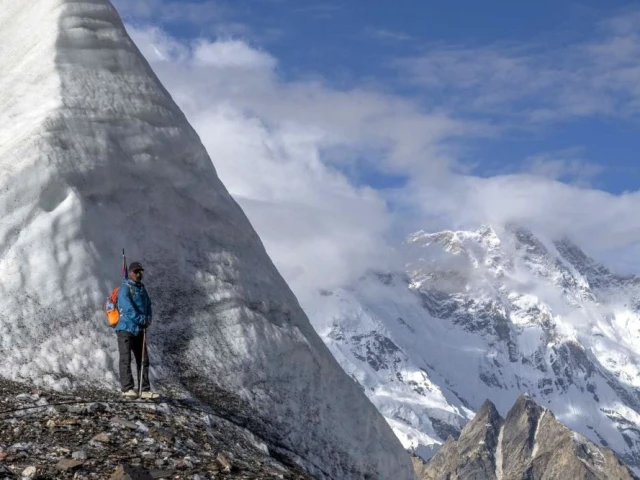Karachi:
Pakistan’s famous northern peaks, Lang a magnet for climbers from all over the world, face an almost collapse of foreign arrivals this season.
Unpredictable climate disasters, regional armed conflicts and sharp fee increases have combined to cut international visits by almost 90%, delivering a serious battle to the country’s mountaineering and tourist economy.
The Gilgit-Baltist region, home to five of the world’s 14 highest mountain-inclusive K2, Nanga Parbat, Broad Peak and Gasher Brush I and II have seen only 270 foreign climbers try expeditions this summer compared to more than 2,000 last year according to Alpine Club in Pakistan.
“Hard weather conditions, including avalanche, rocky and high wind, forced many expeditions to give up their attempts and return without summits,” said Karrar Haidri, vice president of the club, who serves as Pakistan’s official mountaineering.
Climate disasters have been a particular challenge for Pakistan this year, with the country still struggling with some of the deadliest floods in its history, which has demanded at least 1,000 lives, swept villages, immersed agricultural land and forced over 2 million people from their homes, mainly in the northeastern Punjab province.
However, Haidri also emphasized that the fall in arrivals was not only weather -related. “Apart from rain and flooding, the recent wars and an increase in climbing taxes also contributed to the fall in the number of foreign climbers,” Haidri said, referring to a four-day armed conflict between Pakistan and India in May and the 12-day war between Israel and Iran in June.
This season, only 40 climbers succeeded in summit K2, the world’s second highest mountain, while 25 reached the top of Nanga Parbat, and a handful of succeeded with Gasher Brub in, Haidri said.
Local tourism and porters suffer
Gilgit-Baltistan has long been a global destination for mountaineers and hikers offering robust beauty and a unique cultural landscape shaped at intersections in Central and South Asia.
The decline of visitors has destroyed the local economy where tourism is a lifeline. Hotel owners, shop owners, carriers, artisans and even tea stall operators along Karakoram Highway have seen business dry up.
“This is the first dry season after 2020, when there was a total ban on climbing due to Covid-19. I haven’t even joined a single expedition this year,” said Ashraf Ali Raza Sadpara, one of the region’s most experienced porters who summarized K2 three times.
“Normally this would be our busiest time. We had to reject expeditions because of too many offers. But this season has turned into a nightmare,” he said.
Porters – known as Sherpas in the Himalayas – are very skilled in expedition logistics, but often face exploitation. With foreign climbers absent, many are now unemployed and are struggling to provide for their families.
Domestic tourism has also fallen. Last year, more than 1 million local travelers and 24,000 foreign visitors visited without climbing permits Gilgit-Baltistan.
This year, Haidri said, has fallen in both international and domestic arrivals been “alarming.”
Between promotion and protection
Industrial insiders say that another major cause of cancellations is the government’s sharp increase in climbing taxes. Gilgit-Baltistan administration doubled the K2 permit fee from $ 1,750 to $ 3,500 per Climbing while raising fees for other 8,000 meters tops from $ 1,000 to $ 2,500.
“Climbers save money for years to fulfill their dreams. It’s not that they decide today and rush to the mountains. We book them at least a year or two in advance,” said Anwar Syed, an expedition operator with Base in Islamabad.
“When they are told that their costs have doubled or tripled, many cancel their plans. Regional wars deteriorated only the cancellations,” he explained, adding that half of his company’s expeditions were scrapped this season.
Iqbal Hussain, Director-General of Gilgit-Baltistan Tourism Department, defended the climb and called it the first fee increase since 1999.
“The decision was made with several factors into consideration, mainly to protect the environment,” Hussain said. “A gradual increase in commercial expeditions has created problems that can be harmful to the mountains if they are not contained.”
He emphasized that the increase is partly aimed at limiting Rush on K2, the 8,611 meter “Savage Mountain” notorious for its deadly terrain. Even under favorable conditions, 86 climbers have lost their lives by trying the top.
Hussain compared Pakistan’s fees with Nepal, which charges $ 15,000 for Everest permits. “We do our best to promote climbing, but we must also protect the mountains,” he said



